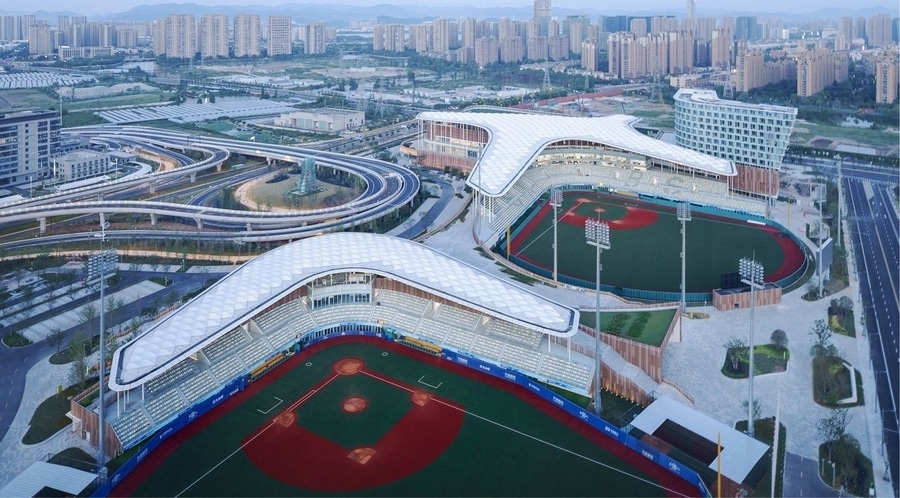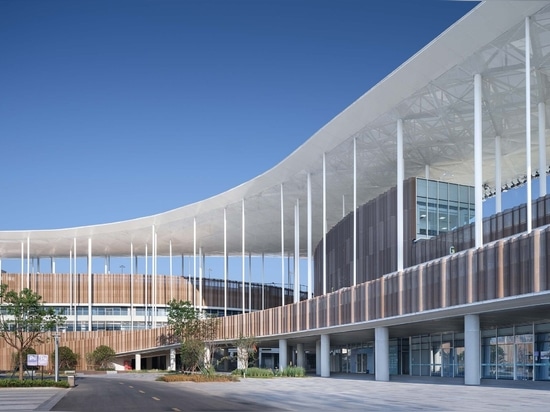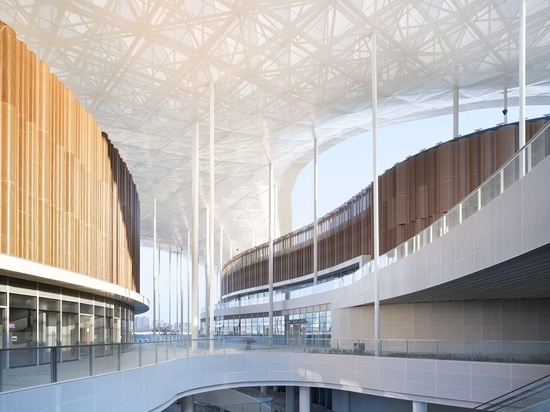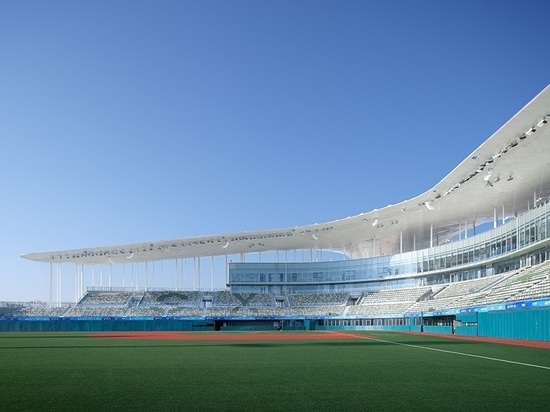
#PUBLIC ARCHITECTURE PROJECTS
Cloud-like winged roof floats above UAD's asian games sports cultural center in Shaoxing
UAD INTEGRATES A SPORTS COMMUNITY WITHIN SHAOXING
UAD rethinks the essence of sports architecture to foster a harmonious relationship between structure, city, and the people. The largest venue of the 19th Asian Games set to be held in China in 2023, ‘Wings of Cloud’ is a sports community integrated with the city. Open air and built without walls to welcome the public at all times, the stadium is topped partially by a cloud-like, winged roof crafted from aluminum and PTFE that emulates rippling waves in the skyline. A strong emphasis on sharing and accessibility pervades the building’s entire lifecycle, forging a link between culture and society as the stadium integrates with its urban context and the ever-changing needs of the community beyond the Asian Games.
Drawing on historical context to reflect contemporary regional culture, UAD looked to the textiles culture of Shaoxing and its image as a water town. The venues are woven together through a ribbon of public platforms on the second floor and connected to the city’s street network. The architectural facade further extracts curvilinear elements from traditional symbols such as silk belts, scrolls, and tile roofs, and uses curved perforated aluminum plates to recall the image of Jiangnan with continuous waves. The perforated patterns in different proportions and forms lend the facade a distinct rhythm — a continuation of the traditional textile craftsmen’s poetry.
‘WINGS OF CLOUD’ REFLECTS ON LOCAL CULTURE
From its composite service function, and the virtuous circle system with the city, to the phenomenon gathered within, ‘Wings of Cloud’ considers the multiple possibilities of the urban context for the present and future. Also known as the Hanghzou Asian Games Baseball and Softball Sports Cultural Center, the facility deviates from conventional paradigms to give rise to a new sports architectural concept. UAD sites the structure at the junction of Keqiao District and Jinghu New District in Shaoxing, an important node and supporting facility in the future of the baseball community. Building the structure for flexibility and adaptability, the architects open the internal public spaces and organically relates them to the surrounding context, in consideration of the center’s function after the Asian Games.
The design builds on the longitude and latitude of the city, community, and cultural factors, and gives full play to the public service nature of sports buildings in the sports community. The project sits on a site of 136,000 square meters, divided into two plots. Plot E houses the softball fields, while Plot A accommodates the baseball fields, training hall, supporting hotels, and a large number of commercial service spaces which can double as community service centers after the Games.
The Hanghzou Asian Games Baseball and Softball Sports Cultural Center’s most prolific feature is a floating ceiling which from the distance emulates ripples blowing across the water — a metaphor for the regional characteristics of Shaoxing water town. It covers a total area of 21,000 square meters, shaped using a bidirectional truss system with a maximum cantilever of 16 meters, supported by slender steel columns and a top surface clad with PTFE film coated with titanium dioxide. The underside of the canopy is clad with curved white perforated aluminum panels, which create a rich layer of diffused light and shadow within.
The translucent visual effect creates openness amid the vast scale of the center, blurring the boundary with the sky. At night, illuminated by LED lighting, the ceiling attains a vibrancy and transparency that provides a unique spectator experience during the game. The surface curvature of the canopy is calculated through the simulation of rain and sunshine, which determines the form prototype so as to achieve the best drainage and shading effect. The thickest of the slender steel columns provide structural support, while the rest are drainage tubes, cable tubes, or purely decorative.
Project info:
Name: The Hangzhou Asian Games Baseball and Softball Sports Cultural Center | Wings of Cloud
Architecture: UAD | The Architectural Design & Research Institute of Zhejiang University Co., Ltd.
Location: Shaoxing, China
Head of design: Dong Danshen, Qian Xidong
Lead architect: Qian Xidong
Project leaders: Zhou Jiawei, Huang Kejie, Yu Haitao
Collaborating architects: Huang Kejie, Ye Shanfeng, Zhu Chengyuan, Zheng Yilin, Zhang Mengyun, Mao Chenglin, Sun Zhenghe, Wu Jingjing, Zhu Erya
Structural design: Xiao Zhibin, Fan Qiguang, Shen Handong, Li Jianli, Guo Jiapeng, Chen Peiwei
Water supply/drainage design: Yi Jiasong, Liu Peiju, Zhang Zhenyu, Zhang Zehang
HVAC design: Yang Yi, Yi Kai, Lu Guangyu, Huang Yunzhou, Yan Yanqiu, Liu Lu
Electrical design: Li Ping, Feng Baile, Zhang Qiang, Zhang Linyan, Wang Bin, Deng Zhouning, Hou Bokai
Geotechnical design: Xu Quanbiao, Zeng Kai, Chen Shengxian, Xu Haonan
Smart design: Ni Gaojun, Ma Jian
Interior design: Li Dan, Xu Weier, Wang Lijun, Zhang Heng, Zhang Zhenwei, Lyu Wenjia
Curtain wall design: Bai Qi’an, Xiang Chun, Jiang Qianyang, Zhang Nan, Zhang Pengfei, Cao Dongqiu
Sports craft design: Beijing Huati Chuangyan
Landscape design: Shangchen Engineering Design Group Co., Ltd.
Floodlighting design: Hangzhou Blue-sky Gardening Construction Group Co., Ltd.
Signage design: Hangzhou Durian Brand Planning Co., Ltd.
Construction: Zhejiang Jinggong Steel Building Group Co.,Ltd.
Owner: Shaoxing Baseball and Softball Stadium Construction and Operation Co., Ltd.





